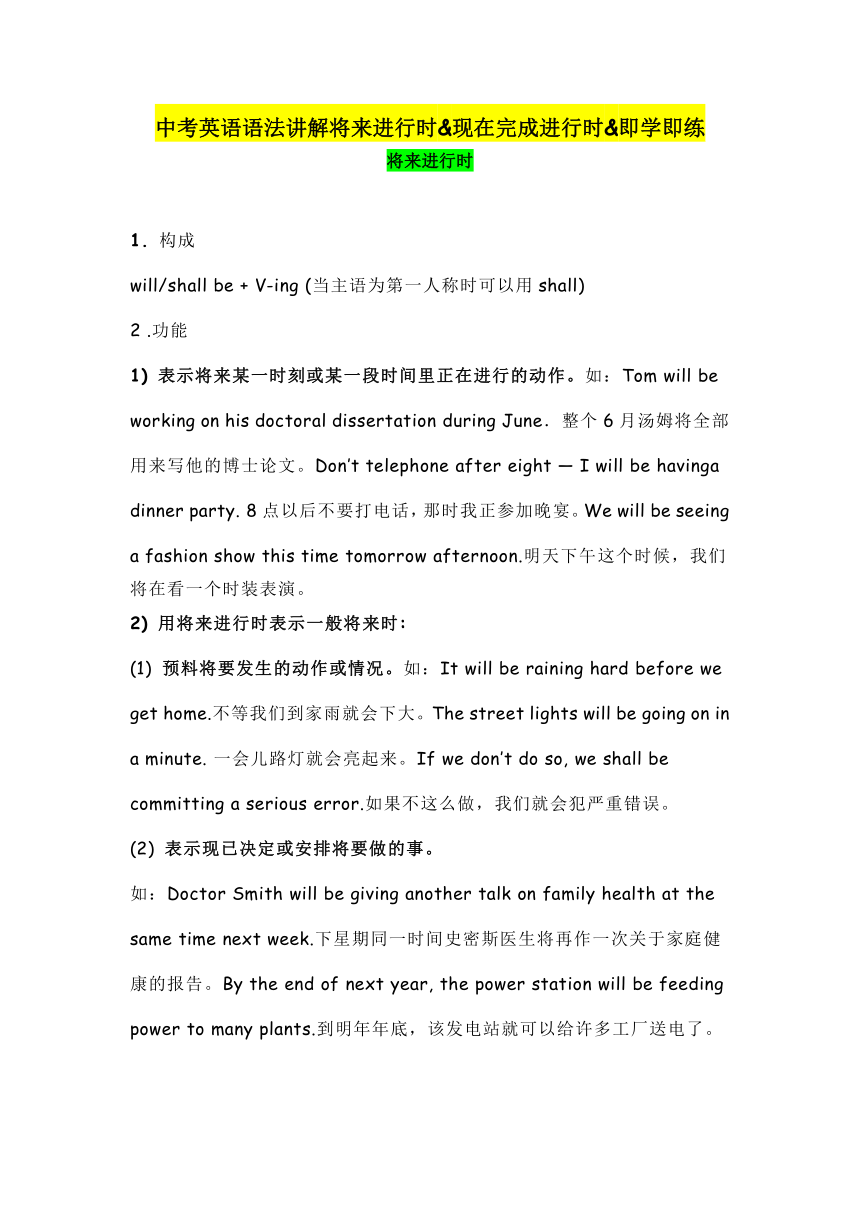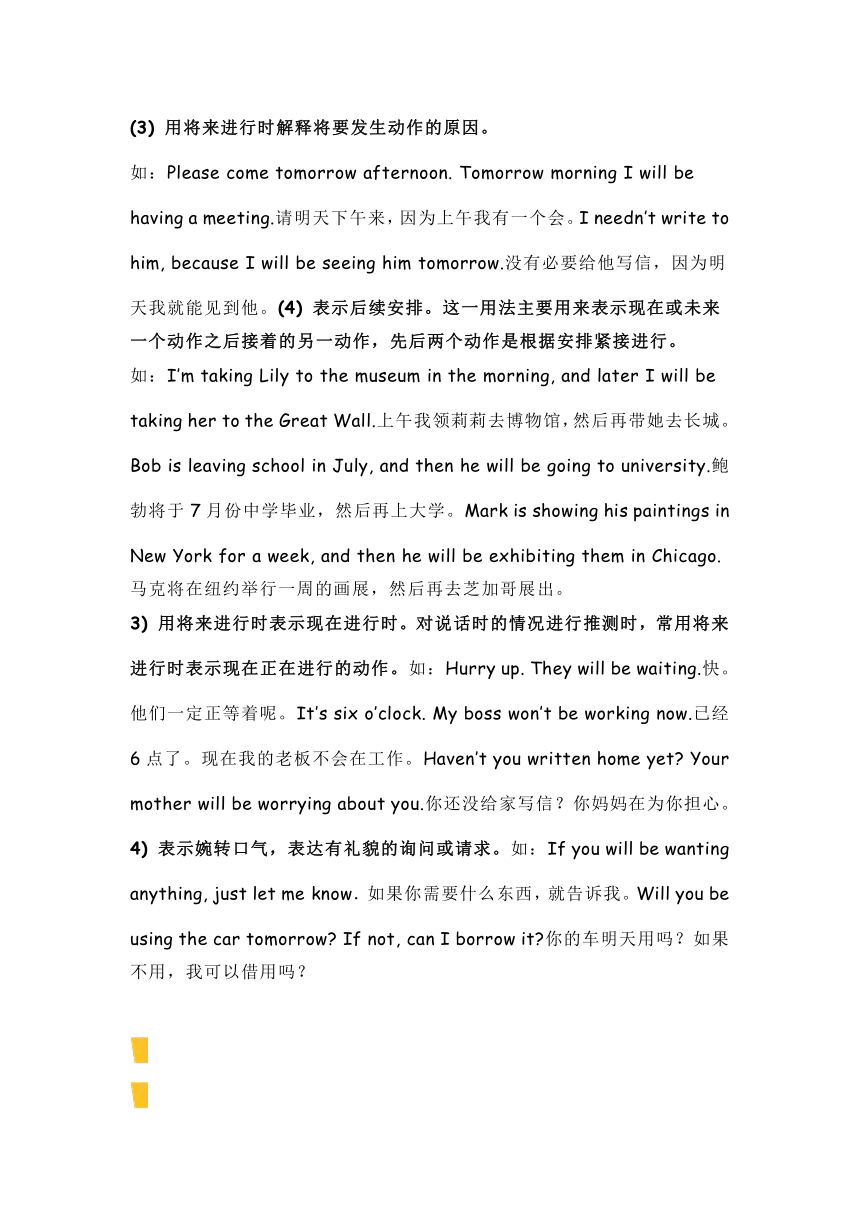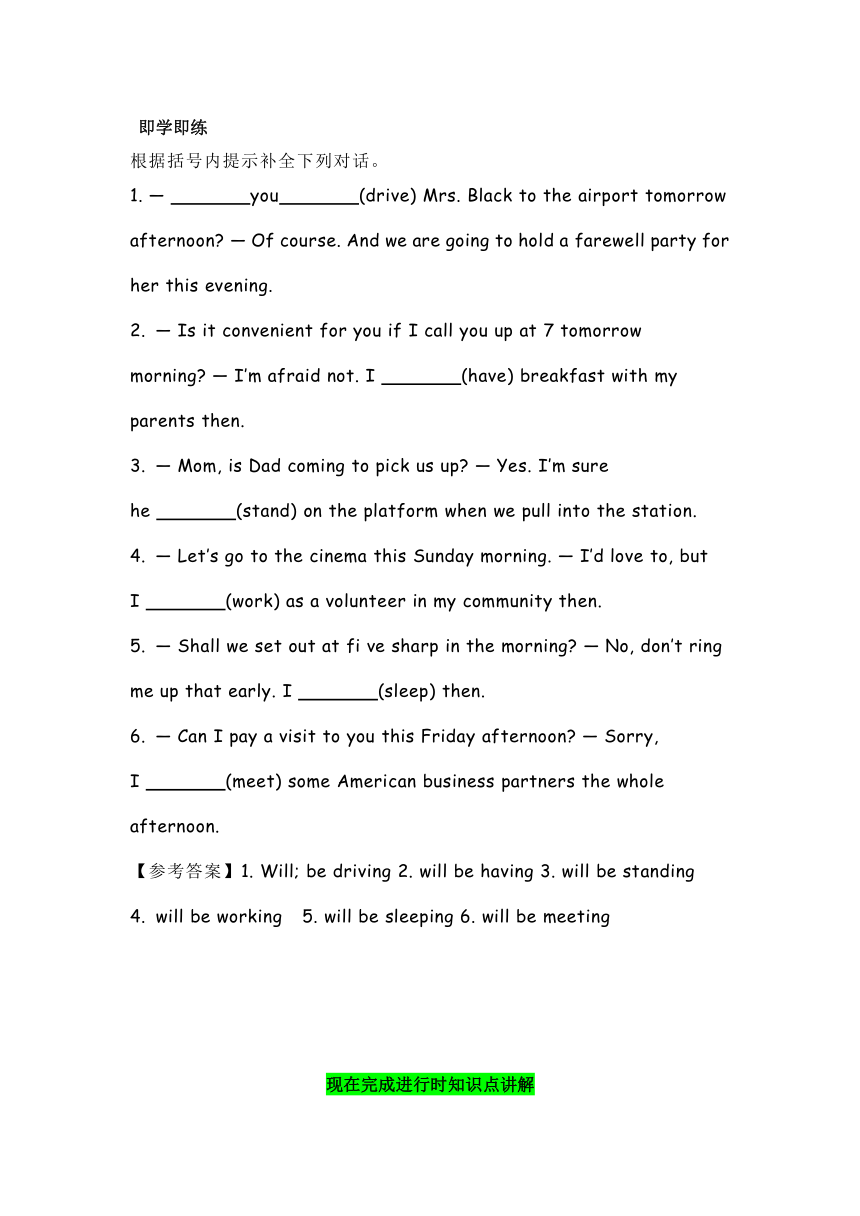2024年中考英语语法讲解将来进行时&现在完成进行时&即学即练(含答案)
文档属性
| 名称 | 2024年中考英语语法讲解将来进行时&现在完成进行时&即学即练(含答案) |  | |
| 格式 | docx | ||
| 文件大小 | 23.6KB | ||
| 资源类型 | 教案 | ||
| 版本资源 | 人教新目标(Go for it)版 | ||
| 科目 | 英语 | ||
| 更新时间 | 2024-06-11 16:29:26 | ||
图片预览



文档简介
中考英语语法讲解将来进行时&现在完成进行时&即学即练
将来进行时
构成
will/shall be + V-ing (当主语为第一人称时可以用shall)
2 .功能
1) 表示将来某一时刻或某一段时间里正在进行的动作。如:Tom will be working on his doctoral dissertation during June.整个6月汤姆将全部用来写他的博士论文。Don’t telephone after eight — I will be havinga dinner party. 8点以后不要打电话,那时我正参加晚宴。We will be seeing a fashion show this time tomorrow afternoon.明天下午这个时候,我们将在看一个时装表演。
2) 用将来进行时表示一般将来时:
预料将要发生的动作或情况。如:It will be raining hard before we get home.不等我们到家雨就会下大。The street lights will be going on in a minute. 一会儿路灯就会亮起来。If we don’t do so, we shall be committing a serious error.如果不这么做,我们就会犯严重错误。
表示现已决定或安排将要做的事。
如:Doctor Smith will be giving another talk on family health at the same time next week.下星期同一时间史密斯医生将再作一次关于家庭健康的报告。By the end of next year, the power station will be feeding power to many plants.到明年年底,该发电站就可以给许多工厂送电了。
(3) 用将来进行时解释将要发生动作的原因。
如:Please come tomorrow afternoon. Tomorrow morning I will be having a meeting.请明天下午来,因为上午我有一个会。I needn’t write to him, because I will be seeing him tomorrow.没有必要给他写信,因为明天我就能见到他。(4) 表示后续安排。这一用法主要用来表示现在或未来一个动作之后接着的另一动作,先后两个动作是根据安排紧接进行。
如:I’m taking Lily to the museum in the morning, and later I will be taking her to the Great Wall.上午我领莉莉去博物馆,然后再带她去长城。Bob is leaving school in July, and then he will be going to university.鲍勃将于7月份中学毕业,然后再上大学。Mark is showing his paintings in New York for a week, and then he will be exhibiting them in Chicago.马克将在纽约举行一周的画展,然后再去芝加哥展出。
3) 用将来进行时表示现在进行时。对说话时的情况进行推测时,常用将来进行时表示现在正在进行的动作。如:Hurry up. They will be waiting.快。他们一定正等着呢。It’s six o’clock. My boss won’t be working now.已经6点了。现在我的老板不会在工作。Haven’t you written home yet Your mother will be worrying about you.你还没给家写信?你妈妈在为你担心。
4) 表示婉转口气,表达有礼貌的询问或请求。如:If you will be wanting anything, just let me know.如果你需要什么东西,就告诉我。Will you be using the car tomorrow If not, can I borrow it 你的车明天用吗?如果不用,我可以借用吗?
即学即练
根据括号内提示补全下列对话。
1. — you (drive) Mrs. Black to the airport tomorrow afternoon — Of course. And we are going to hold a farewell party for her this evening.
— Is it convenient for you if I call you up at 7 tomorrow morning — I’m afraid not. I (have) breakfast with my parents then.
— Mom, is Dad coming to pick us up — Yes. I’m sure he (stand) on the platform when we pull into the station.
— Let’s go to the cinema this Sunday morning. — I’d love to, but I (work) as a volunteer in my community then.
— Shall we set out at fi ve sharp in the morning — No, don’t ring me up that early. I (sleep) then.
— Can I pay a visit to you this Friday afternoon — Sorry, I (meet) some American business partners the whole afternoon.
【参考答案】1. Will; be driving 2. will be having 3. will be standing
will be working 5. will be sleeping 6. will be meeting
现在完成进行时知识点讲解
1. 构成have(has) + been+ 动词的现在分词
2. 功能1) 表示一个从过去某时开始发生,一直延续到说话时刻,并且可能延续下去的动作。如:I have been waiting for an hour but she still hasn’t come. 我已等了一个小时,但她还没有来。We have been doing everything possible to improve the working conditions. 我们一直在尽一切努力改善工作条件。Man has continuously been trying to make better use of natural materials and create new ones.人类一直在尝试更好地利用天然材料和创造新材料。
2) 表示一个动作从过去某时开始,一直延续到说话时刚刚结束。如:He is dead drunk. He has been drinking with his friends. 他酩酊大醉,刚刚在同朋友们喝酒来着。My clothes are wet. I have been walking in the rain. 我的衣服湿了, 我一直走在雨中。Where have you been I have been looking for you everywhere. 你去哪儿了?我一直到处找你。
3) 表示某种感彩。如:I have been wanting to see you for a long time. (愿望)Who has been telling you such nonsense (气愤)You have been deceiving me. (气愤)You have been giving me everything. (感激)
4) 表示过去某种愿望未实现,某种企图、希望落空,含有遗憾、不耐烦等情绪。如:They have been going to build a bridge over the lake for years.近年来,他们一直想在湖上建一座桥。(但未能实现)He has been going to have the leaking tap fixed for a few days.几天来,他一直想把漏水的水龙头修理一下。(但总没抽出时间修理)
5) 表示一个过去动作对现在的影响或造成的结果。如:The room stinks. Someone has been smoking in here. 屋里有烟味,有人抽烟了。The girl’s eyes are red. She has been crying. 那个女孩的眼睛红红的。她一直在哭。
6) 表示重复(指断断续续, 而非一直不停)。如:We have been discussing the matter several times this year. 我们今年已数次讨论过那件事。We have all along been making mistakes like this. 我们一直犯这样的错误。She has been phoning Jim every night for the past two weeks. 两个星期以来她每天晚上给吉姆打电话。
即学即练
根据括号内提示补全下列句子。
I’m sure you will do better on the test because you (study) so hard this year.
Tina ought to stop reading; she has a headache because she (read) too long.
The manager (tell) the workers how to improve the effi ciency of work since 9 am.
The committee (argue) over the problem among themselves for two hours.
5. Now that she is out of a job, Lucy (consider) going back to school, but she hasn’t decided yet.
【参考答案】1. have been studying2. has been reading3. has been telling4. has/have been arguing5. has been considering
将来进行时
构成
will/shall be + V-ing (当主语为第一人称时可以用shall)
2 .功能
1) 表示将来某一时刻或某一段时间里正在进行的动作。如:Tom will be working on his doctoral dissertation during June.整个6月汤姆将全部用来写他的博士论文。Don’t telephone after eight — I will be havinga dinner party. 8点以后不要打电话,那时我正参加晚宴。We will be seeing a fashion show this time tomorrow afternoon.明天下午这个时候,我们将在看一个时装表演。
2) 用将来进行时表示一般将来时:
预料将要发生的动作或情况。如:It will be raining hard before we get home.不等我们到家雨就会下大。The street lights will be going on in a minute. 一会儿路灯就会亮起来。If we don’t do so, we shall be committing a serious error.如果不这么做,我们就会犯严重错误。
表示现已决定或安排将要做的事。
如:Doctor Smith will be giving another talk on family health at the same time next week.下星期同一时间史密斯医生将再作一次关于家庭健康的报告。By the end of next year, the power station will be feeding power to many plants.到明年年底,该发电站就可以给许多工厂送电了。
(3) 用将来进行时解释将要发生动作的原因。
如:Please come tomorrow afternoon. Tomorrow morning I will be having a meeting.请明天下午来,因为上午我有一个会。I needn’t write to him, because I will be seeing him tomorrow.没有必要给他写信,因为明天我就能见到他。(4) 表示后续安排。这一用法主要用来表示现在或未来一个动作之后接着的另一动作,先后两个动作是根据安排紧接进行。
如:I’m taking Lily to the museum in the morning, and later I will be taking her to the Great Wall.上午我领莉莉去博物馆,然后再带她去长城。Bob is leaving school in July, and then he will be going to university.鲍勃将于7月份中学毕业,然后再上大学。Mark is showing his paintings in New York for a week, and then he will be exhibiting them in Chicago.马克将在纽约举行一周的画展,然后再去芝加哥展出。
3) 用将来进行时表示现在进行时。对说话时的情况进行推测时,常用将来进行时表示现在正在进行的动作。如:Hurry up. They will be waiting.快。他们一定正等着呢。It’s six o’clock. My boss won’t be working now.已经6点了。现在我的老板不会在工作。Haven’t you written home yet Your mother will be worrying about you.你还没给家写信?你妈妈在为你担心。
4) 表示婉转口气,表达有礼貌的询问或请求。如:If you will be wanting anything, just let me know.如果你需要什么东西,就告诉我。Will you be using the car tomorrow If not, can I borrow it 你的车明天用吗?如果不用,我可以借用吗?
即学即练
根据括号内提示补全下列对话。
1. — you (drive) Mrs. Black to the airport tomorrow afternoon — Of course. And we are going to hold a farewell party for her this evening.
— Is it convenient for you if I call you up at 7 tomorrow morning — I’m afraid not. I (have) breakfast with my parents then.
— Mom, is Dad coming to pick us up — Yes. I’m sure he (stand) on the platform when we pull into the station.
— Let’s go to the cinema this Sunday morning. — I’d love to, but I (work) as a volunteer in my community then.
— Shall we set out at fi ve sharp in the morning — No, don’t ring me up that early. I (sleep) then.
— Can I pay a visit to you this Friday afternoon — Sorry, I (meet) some American business partners the whole afternoon.
【参考答案】1. Will; be driving 2. will be having 3. will be standing
will be working 5. will be sleeping 6. will be meeting
现在完成进行时知识点讲解
1. 构成have(has) + been+ 动词的现在分词
2. 功能1) 表示一个从过去某时开始发生,一直延续到说话时刻,并且可能延续下去的动作。如:I have been waiting for an hour but she still hasn’t come. 我已等了一个小时,但她还没有来。We have been doing everything possible to improve the working conditions. 我们一直在尽一切努力改善工作条件。Man has continuously been trying to make better use of natural materials and create new ones.人类一直在尝试更好地利用天然材料和创造新材料。
2) 表示一个动作从过去某时开始,一直延续到说话时刚刚结束。如:He is dead drunk. He has been drinking with his friends. 他酩酊大醉,刚刚在同朋友们喝酒来着。My clothes are wet. I have been walking in the rain. 我的衣服湿了, 我一直走在雨中。Where have you been I have been looking for you everywhere. 你去哪儿了?我一直到处找你。
3) 表示某种感彩。如:I have been wanting to see you for a long time. (愿望)Who has been telling you such nonsense (气愤)You have been deceiving me. (气愤)You have been giving me everything. (感激)
4) 表示过去某种愿望未实现,某种企图、希望落空,含有遗憾、不耐烦等情绪。如:They have been going to build a bridge over the lake for years.近年来,他们一直想在湖上建一座桥。(但未能实现)He has been going to have the leaking tap fixed for a few days.几天来,他一直想把漏水的水龙头修理一下。(但总没抽出时间修理)
5) 表示一个过去动作对现在的影响或造成的结果。如:The room stinks. Someone has been smoking in here. 屋里有烟味,有人抽烟了。The girl’s eyes are red. She has been crying. 那个女孩的眼睛红红的。她一直在哭。
6) 表示重复(指断断续续, 而非一直不停)。如:We have been discussing the matter several times this year. 我们今年已数次讨论过那件事。We have all along been making mistakes like this. 我们一直犯这样的错误。She has been phoning Jim every night for the past two weeks. 两个星期以来她每天晚上给吉姆打电话。
即学即练
根据括号内提示补全下列句子。
I’m sure you will do better on the test because you (study) so hard this year.
Tina ought to stop reading; she has a headache because she (read) too long.
The manager (tell) the workers how to improve the effi ciency of work since 9 am.
The committee (argue) over the problem among themselves for two hours.
5. Now that she is out of a job, Lucy (consider) going back to school, but she hasn’t decided yet.
【参考答案】1. have been studying2. has been reading3. has been telling4. has/have been arguing5. has been considering
同课章节目录
- 词法
- 名词
- 动词和动词短语
- 动词语态
- 动词时态
- 助动词和情态动词
- 非谓语动词
- 冠词
- 代词
- 数词和量词
- 形容词副词及其比较等级
- 介词和介词短语
- 连词和感叹词
- 构词法
- 相似、相近词比较
- 句法
- 陈述句
- 一般疑问句和否定疑问句
- 特殊疑问句及选择疑问句
- 反意疑问句
- 存在句(There be句型)
- 宾语从句
- 定语从句
- 状语从句
- 主谓一致问题
- 简单句
- 并列句
- 复合句
- 主谓一致
- 主、表语从句
- 名词性从句
- 直接引语和间接引语
- 虚拟语气
- 感叹句
- 强调句
- 倒装句
- 祈使句
- 句子的成分
- 句子的分类
- 题型专区
- 单项选择部分
- 易错题
- 完形填空
- 阅读理解
- 词汇练习
- 听说训练
- 句型转换
- 补全对话
- 短文改错
- 翻译
- 书面表达
- 任务型阅读
- 语法填空
- 其他资料
